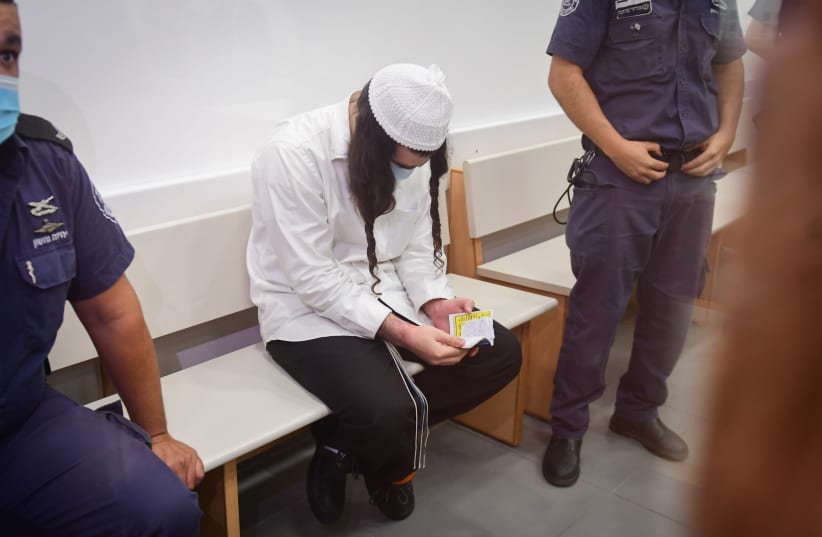The state filed a legal brief late Tuesday night rejecting attempts by Amiram Ben Uliel for disclosing more information about enhanced interrogation techniques which the Shin Bet used against him during his confession.
The brief was filed to the Supreme Court opposing Ben Uliel’s appeal of his conviction for multiple terrorist arson murders of the Palestinian Dawabshe family and multiple life sentences rendered by the Lod District Court.
Central to the state’s arguments were both procedural and substantive grounds.
Procedurally, the state said that Ben Uliel should be precluded from asking for any new evidence during his appeal that he had not asked for during his trial at the district court level.
It also said that there should not be a separate process to debate new evidence before there is an in-person hearing before the justices over all of the appeal’s issues together.
Substantively, the state said that Ben Uliel’s arguments would not meet the test of being needed “for the interests of justice,” nor would any new evidence lead to “a new result.”
Further, the state said that allowing a debate over forcing the disclosure of new evidence during the appeals process would contradict the important principle of “finality” for trials.
It said appeals are usually only about whether the lower court got the law wrong given the facts that came out at trial, not about introducing new facts.
On Monday, lawyers for Ben Uliel had requested new disclosures of how the Shin Bet (Israel Security Agency) treated him during his interrogation.
According to Ben Uliel’s lawyers, Avigdor Feldman and Yehoshua Resnick, the Shin Bet and Attorney-General Avichai Mandelblit undertook and authorized illegal torture of their client without sufficient legal grounds.
The only legal grounds for the agency’s aggressive enhanced interrogation methods is to prevent a “ticking bomb” style impending attack, which the lawyers allege was not in play, and the only purpose was to try to get Ben Uliel to confess to the arson murders.
In the original trial before the district court, that lower court did toss out any confessions Ben Uliel made in the 36 hours after he was given enhanced interrogation, but permitted using for evidence statements he made before and after those 36 hours.
In the new appeal to the Supreme Court, Ben Uliel’s lawyers hope to toss more of the evidence beyond the 36-hour time frame and then to reverse the conviction itself.
They also noted an Uvda interview of Deputy Attorney-General Raz Nizri in January 2020 which could open up law enforcement to having to share additional information that it had not revealed to date.
To defeat the state’s arguments that introducing new evidence is barred during an appeal, Ben Uliel’s lawyers will need to convince the Supreme Court that there is “smoking gun”-level evidence which would likely change the outcome of the trial.
This has occurred before – the Supreme Court allowed new evidence in the state’s appeal against former prime minister Ehud Olmert’s acquittal in the Talansky Affair, which led to a retrial and Olmert’s later conviction.
But such cases are extremely rare.
In September, the Lod District Court sentenced Ben Uliel to three life sentences.
The July 2015 attack killed 18-month-old Ali and his parents, Sa’ad and Riham, and destabilized Israeli-Arab relations throughout the region.
An unusual aspect of the appeal is that Feldman usually defends Palestinians and causes on the political Left.
However, Feldman was the lawyer who convinced the High Court to outlaw Shin Bet interrogation torture in 1999, so he has a special connection to the issue, whether impacting those on the Right or the Left.
Besides Ben Uliel’s confession, the lower court said it was convinced by his voluntary physical reconstruction of the crime at the scene of the murders.
In addition, the court cited Ben Uliel’s refusal to testify in his own defense.
The court wrote: “The defendant described the scene of the crime in extreme detail in his confessions... which was later clarified to be meticulously accurate... the defendant carried out a reconstruction with great accuracy and which was close to identical to his confessions – something that rebuts the claims” that he was guessing or tipped off in the moment by the Shin Bet investigators.
FOR MONTHS after the murder, the Shin Bet performed a massive manhunt and investigation, but turned up empty-handed.
When the Shin Bet finally apprehended Ben Uliel as well as a minor who was accused of conspiring with him regarding the murders, the situation was viewed as so desperate that they used torture/enhanced interrogation to get the defendants to confess.
This ushered in a whole new side and saga to the case, because suddenly, enhanced interrogation, administrative detention and other extreme measures were being used not only against Palestinians, as they had been in the past, but also against Jews.
